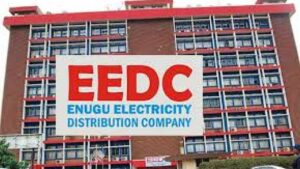
Residents and shop owners in the South-East region, along with the Indigenous People of Biafra (IPOB), are currently embroiled in a confrontation with the Enugu Electricity Distribution Company (EEDC) regarding frequent power outages and what they deem as exorbitant billing practices.
Extensive investigations have revealed that individuals residing in major cities such as Onitsha, Nnewi, Obosi, Awka, Ekwulobia, as well as communities across Anambra State’s 21 local government areas, are expressing their frustrations over the “outrageous and burdensome estimated electricity bills” imposed by Enugu Disco, despite the persistent lack of electricity supply.
In a statement issued on Tuesday, IPOB’s spokesperson, Emma Powerful, urged the South-East governors to take decisive action by expelling EEDC from the region due to their alleged “cruel” practices of continuously escalating electricity charges without providing adequate power to the people. IPOB further accused Sir Emeka Offor, the owner of EEDC, of being complicit in the oppression of the South-East, asserting that the company deliberately withholds electricity from the region while subjecting Ndigbo to unjustifiably high electricity bills.
IPOB implored the South-East governors to prioritize good governance, deliver quality services, and establish an enabling investment environment that fosters economic growth. The group emphasized that the recent electricity reform initiated by the Federal Government grants each state the authority to generate and distribute electricity, thereby enabling the governors to attract reliable and affordable electricity providers to serve the region.
Expressing their grievances, residents from Onitsha, Nnewi, and Awka highlighted the prolonged absence of electricity in their homes, despite receiving disproportionately high bills from EEDC. These residents, led by their landlords, alleged that EEDC Chairman Sir Emeka Offor’s efforts to ensure regular and affordable electricity supply to the South-East have been obstructed by the company’s refusal to provide prepaid meters for consumers in the zone.
Chukwudi Ikem, a resident of Onwuachusi Street in Onitsha, expressed frustration, stating that their community has experienced frequent power outages since October of the previous year, yet they continue to receive exorbitant bills. The residents stressed their willingness to pay for electricity consumed but demanded an end to the issuance of inflated estimated bills.
Stephen Okechukwu, a fun spot operator in Awka, lamented the adverse effects of power outages and high diesel costs on businesses in the area. He emphasized that the installation of prepaid meters would help alleviate the situation and called upon the electricity providers to address the issue promptly.
In response to these allegations, EEDC spokesman Emeka Ezeh attributed the persistent poor power supply to insufficient gas supply, which hampers the thermal generating companies responsible for electricity generation. Ezeh clarified that EEDC’s distribution is limited to the allocated nine percent of the total energy generated in the country, and the issue extends beyond EEDC, affecting all 11 electricity distribution companies nationwide. Regarding the accusations of excessive billing and extortion, Ezeh emphasized that EEDC operates in compliance with industry regulations set by the Nigerian Electricity Regulatory Commission (NERC) and provides customers with a channel to address any grievances they may have.
EEDC appealed for understanding from its customers, particularly in light of the current power supply challenges, which are beyond the company’s control. Emphasizing the philanthropic endeavors of EEDC Chairman Sir Dr. Emeka Offor, the spokesman highlighted his positive contributions to both the local and global communities.
The ongoing dispute between IPOB, residents, and shop owners with EEDC revolves around the issues of power outages and excessive billing. While residents express their frustrations over the lack of electricity supply and inflated bills, EEDC attributes the situation to gas constraints affecting power generation. The company, under the guidance of industry regulations, has called for customers to utilize established complaint mechanisms to address their concerns.

